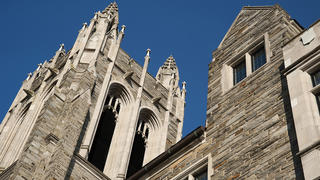Marian Anderson Doc Screens on Hawk Hill
"Once in a Hundred Years: The Life and Legacy of Marian Anderson" chronicles the life of the legendary vocalist and activist.

 Philadelphia native Marian Anderson had the voice of the century. As one of the most celebrated vocalists of the 1900s, Anderson’s voice was described by critics as a “rich, vibrant contralto of intrinsic beauty.” But as a black woman of rising notoriety in the ‘30s, she was quickly put in a position to raise that voice in protest.
Philadelphia native Marian Anderson had the voice of the century. As one of the most celebrated vocalists of the 1900s, Anderson’s voice was described by critics as a “rich, vibrant contralto of intrinsic beauty.” But as a black woman of rising notoriety in the ‘30s, she was quickly put in a position to raise that voice in protest.
Four years ago, Bill Nicoletti ’86 began his deep-dive into the story of Marian Anderson, inspired by her reluctant activism. “She was like Jackie Robinson for the arts,” he suggests. “[She] faced adversity the likes of which we can’t comprehend. That perseverance, combined with her talent, took her to the international stage."
Nicoletti directed and produced his documentary, Once in a Hundred Years: The Life and Legacy of Marian Anderson, to explore Anderson’s most iconic moments in the spotlight.
Anderson skyrocketed to a place of quasi-political power in 1939 after courageously performing in front of the Lincoln Memorial. The Daughters of the American Revolution (DAR) refused to let Anderson perform at Constitution Hall that evening, causing First Lady Eleanor Roosevelt to resign from the DAR and give permission for the concert on the Washington Mall. Harold Ickes, then-Secretary of the Interior, famously introduced Anderson to more than 75,000 onlookers by announcing, “In this great auditorium under the sky, all of us are free.”
Anderson was the first of her kind who laid bare the moral bankruptcy of racial segregation on the classical music stage. Although her often submissive navigation of Jim Crow America could be mistaken for quiescence — she performed in horizontally segregated halls and took dinners alone in hotel rooms to avoid the spectacle of being turned away at public eateries — her protest primarily came in the unfurling of her voice — a gentle, majestic instrument, both vast in range and warm in tone.
As Anderson herself explained it in her memoir, “I always bear in mind that my mission is to leave behind me the kind of impression that will make it easier for those who follow.”
“Like a Jesuit, she became a person for others,” Nicoletti observes. "It’s fascinating to me that Marian’s story has never really been told."
Once in a Hundred Years tells Anderson’s story through archival footage and on-camera interviews with five notable individuals, including Dr. Brent Smith, SJU professor of marketing. These interviews detail the impact Anderson's journey had on each individual's personal and professional life. The documentary is scheduled to screen on Hawk Hill as an initiative of SJU’s Office of Inclusion & Diversity (OID) and the Pedro Arrupé, S.J. Center of Business Ethics.
John McCall, director of the Arrupé Center, and Imani Brisco, of the OID, eagerly anticipate sharing this film with the rest of campus.
"We saw this as a means of bridging Black History Month with Women's History Month,” explains Briscoe. “It’s great to be able to offer our students the opportunity to learn about a dark chapter in our nation's history and about this great Philadelphian's contribution to the cause of civil rights.”
McCall agrees, “Anderson challenged the prejudice of her time through the power of her voice and her dignity on the stage.”
Once in a Hundred Years: The Life and Legacy of Marian Anderson premiered at the Kimmel Center on Feb. 23 with a follow-up screening on Hawk Hill at the Cardinal John P. Foley Campus Center on February 28. Saint Joseph’s University is among nine other institutions screening the documentary. 6ABC and WHYY will also be airing the documentary in February as part of their pledge drives during Black History Month.
